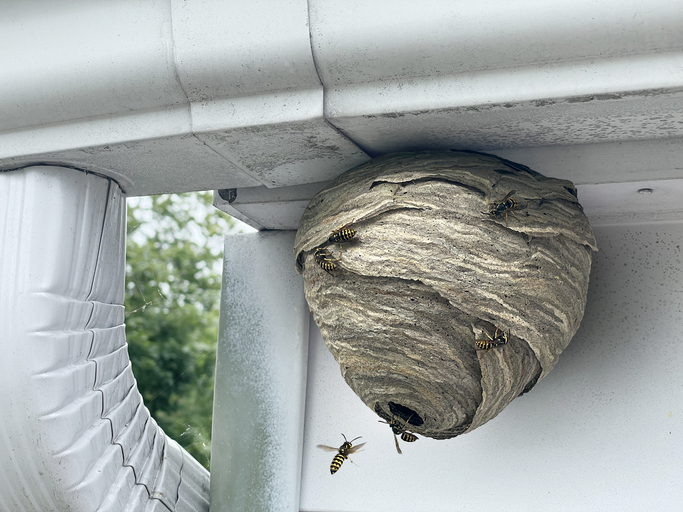Warm weather in Western Massachusetts and the Hartford area brings backyard barbecues, blooming gardens, and unfortunately, stinging insects. American Pest Solutions, a trusted local pest control company, has been helping homes and businesses in Western Massachusetts, Hartford, East Hartford, and West Hartford stay safe from stinging insects and other pests for years.
Knowing which species you’re dealing with can help protect your family, pets, and property. Here’s a guide to four common stingers in our region: yellow jackets, white or bald-faced hornets, paper wasps, and cicada killers.
Identify the Insects in Your Yard
Yellow Jackets
Stocky with bright yellow and black markings, yellow jackets are often aggressive around food, drinks, and trash. They build nests in the ground, wall voids, or other hidden cavities and will fiercely defend them if disturbed. These insects are highly social, which means multiple workers may swarm at once if they feel threatened.
White or Bald-Faced Hornets
Larger than yellow jackets, bald-faced hornets have a distinctive white face and dark body. They construct large, football-shaped paper nests high in trees, shrubs, or sometimes on the sides of buildings. Highly protective of their nests, they will aggressively defend their colony from intruders.
Paper Wasps
Paper wasps are slender, with long legs that hang noticeably during flight. Their nests, shaped like small umbrellas, are often attached under eaves, decks, or porch ceilings. Paper wasps are generally less aggressive than yellow jackets and hornets but will sting if they feel their nest is threatened.
Cicada Killers
Cicada killers are large, solitary wasps that dig burrows in lawns or sandy soil to provision food for their young. While their size and buzzing flight may be intimidating, they rarely sting humans. Only females are capable of stinging, and they usually do so only in defense.
Why These Stingers Matter
Stings can range from painful to life-threatening for those with allergies. Yellow jackets and hornets are responsible for most incidents because they nest close to human activity and may swarm. Paper wasps are less aggressive but still pose a risk near homes, while cicada killers rarely sting but can alarm families in busy yards.
Simple steps reduce the likelihood of stinging insect problems:
Keep trash cans sealed and clean food spills promptly.
Cover outdoor food and drinks during gatherings.
Seal gaps in siding, under eaves, and around pipes.
Remove old paper wasp nests in late winter.
Reduce bare soil patches where cicada killers might burrow.
These measures are especially effective for properties in Western Massachusetts and Hartford’s suburban neighborhoods.
When to Call the Professionals
DIY removal of stinging insect nests should only be attempted in low-risk situations. Even smaller nests can become dangerous if the insects feel threatened or if you’re not wearing proper protective gear.
Call a professional if:
Nests are in walls, attics, or underground.
Large nests or multiple nests appear on your property.
Residents have known severe allergies.
Nests are near doors, play areas, or high-traffic paths.
Professional pest control experts use safe, targeted methods to remove nests and prevent re-infestation while minimizing risk to people, pets, and beneficial pollinators.
How American Pest Solutions Can Help
American Pest Solutions provides expert inspection and removal services for yellow jackets, bald-faced hornets, paper wasps, and cicada killers across Western Massachusetts, Hartford, East Hartford, and West Hartford. Technicians identify the species, assess the nest location, and recommend the safest and most effective treatment plan for your home or business.
If you spot a nest on your property, don’t wait until someone gets stung. Contact us online or call (413) 966-1095 today to request your service!

